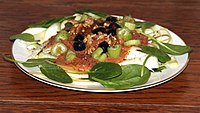Raw veganism: Difference between revisions
m Date the maintenance tags or general fixes |
rm top link |
||
| Line 25: | Line 25: | ||
{{Vegetarianism}} |
{{Vegetarianism}} |
||
[[Category:Veganism |
[[Category:Veganism]] |
||
[[Category:Intentional living]] |
[[Category:Intentional living]] |
||
[[Category:Nutrition]] |
[[Category:Nutrition]] |
||
Revision as of 21:14, 15 July 2008

Raw veganism is a diet which combines veganism and raw foodism. It excludes all food of animal origin, and all food cooked above 46 degrees Celsius (115 degrees Fahrenheit). A raw vegan diet includes raw vegetables and fruits, nuts and nut pastes, grain and legume sprouts, seeds, plant oils, sea vegetables, herbs, and fresh juices. There are many different versions of the diet, including fruitarianism, sproutarianism, etc. Although some advocate a diet of only fruit, or only vegetables, generally it is agreed that a well balanced raw vegan diet, containing moderate amounts of all of the above foods, is the best for good health. [citation needed] Sometimes the definition of a raw vegan diet is loosened to include vegan diets with at least 75% raw foods.
Motivations
In addition to the ethics of eating meat, dairy, eggs and honey, a raw vegan may be motivated by:
Health reasons
Raw vegans believe that cooking foods destroys almost all healthy enzymes, a large part of vitamins and nutrients, approximately half of the protein content of the food and causes fats to become rancid (see trans fat).
Environmental reasons
Some raw vegans are concerned about deforestation and sustainability, believing the use of wood or fossil fuels in cooking is harmful to the environment.
Sensitive Tongue
Raw vegans sometimes switch to the diet from regular veganism due to concern over damaging the inside of their mouth and tongue due to the hot food. Some raw vegans draw a line between extremely hot food and an increase in mouth cancer. [citation needed]
Controversies
Raw veganism is yet to be formally studied on a wide enough scale to secure its reputation as a truly healthy diet. However, many raw vegans claim their personal experiences with the diet, and simple logic (usually citing that humans are the only animal to eat cooked food and have by far the longest list of degenerative diseases of any animal), secure their faith in the diet. Also, many medical authorities stress the possible lack of vitamin B12 in the diet, which is naturally present in large quantities in animal foods and is essential for many bodily functions. Raw vegans often supplement vitamin B12, or obtain it from fermented foods or other foods containing small quantities of B12.
